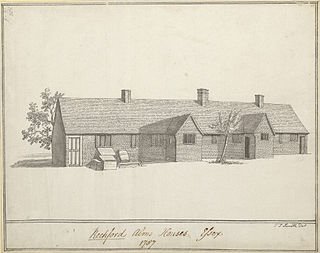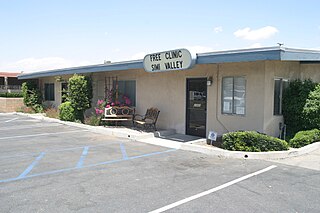 W
WAn almshouse is charitable housing provided to people in a particular community. They are often targeted at the poor of a locality, at those from certain forms of previous employment, or their widows, and at elderly people who can no longer pay rent, and are generally maintained by a charity or the trustees of a bequest. Almshouses were originally formed as extensions of the church system and were later adapted by local officials and authorities.
 W
WA community fridge is a refrigerator located in a public space. The fridges, sometimes called "freedges", are a type of mutual aid project that enables food to be shared within a community. Some community fridges also have an associated area for non-perishable food. Unlike traditional food pantries, anyone can put food in and take food out without limit, helping to remove the stigma from its use. The main aim of community fridges is to reduce food insecurity, while also mitigating food waste. They enable people facing hardship to have easy access to fresh, nutritious food. Community fridges can also serve as social spaces that enable people to connect to their communities; Shelterforce magazine notes that "community fridges seem to have discovered a sweet spot in service delivery: close enough to feel the warmth of shared humanity, but far enough to avoid a sense of resentment or burden."
 W
WA cooperative is "an autonomous association of persons united voluntarily to meet their common economic, social, and cultural needs and aspirations through a jointly-owned enterprise". Cooperatives are democratically owned by their members, with each member having one vote in electing the board of directors. Cooperatives may include:businesses owned and managed by the people who use their services organizations managed by the people who work there multi-stakeholder or hybrid cooperatives that share ownership between different stakeholder groups. For example, care cooperatives where ownership is shared between both care-givers and receivers. Stakeholders might also include non-profits or investors. second- and third-tier cooperatives whose members are other cooperatives platform cooperatives that use a cooperatively owned and governed website, mobile app or a protocol to facilitate the sale of goods and services.
 W
WCorporate social responsibility (CSR) is a form of international private business self-regulation which aims to contribute to societal goals of a philanthropic, activist, or charitable nature by engaging in or supporting volunteering or ethically-oriented practices. While once it was possible to describe CSR as an internal organisational policy or a corporate ethic strategy, that time has passed as various national and international laws have been developed and various organisations have used their authority to push it beyond individual or even industry-wide initiatives. While it has been considered a form of corporate self-regulation for some time, over the last decade or so it has moved considerably from voluntary decisions at the level of individual organizations to mandatory schemes at regional, national, and international levels.
 W
WA food bank is a non-profit, charitable organization that distributes food to those who have difficulty purchasing enough to avoid hunger.
 W
WFood swaps are events where members of a local community meet up to share homemade, homegrown, and foraged foods with each other. Apart from diversifying their larders and redistributing surpluses and gluts, they provide opportunities for building stronger communities, and picking up tips. No money changes hands. Attendees bring items that they wish to swap and then bid for each other's produce, either verbally or on cards in the form of a silent auction, until suitable swaps are negotiated. Often attendees bring extra items either as free samples or as contributions to a potluck lunch or tea, so that there is more time to get to know each other, exchange gossip and pass on tips.
 W
WA free clinic or walk in clinic is a health care facility in the United States offering services to economically disadvantaged individuals for free or at a nominal cost. The need for such a clinic arises in societies where there is no universal healthcare, and therefore a social safety net has arisen in its place. Core staff members may hold full-time paid positions, however, most of the staff a patient will encounter are volunteers drawn from the local medical community.
 W
WA housing cooperative, or housing co-op, is a legal entity, usually a cooperative or a corporation, which owns real estate, consisting of one or more residential buildings; it is one type of housing tenure. Housing cooperatives are a distinctive form of home ownership that have many characteristics that differ from other residential arrangements such as single family home ownership, condominiums and renting.
 W
WLittle Free Library is a 501(c)(3) nonprofit organization that promotes neighborhood book exchanges, usually in the form of a public bookcase. More than 90,000 public book exchanges are registered with the organization and branded as Little Free Libraries. Through Little Free Libraries, present in 91 countries, millions of books are exchanged each year, with the aim of increasing access to books for readers of all ages and backgrounds. The Little Free Library nonprofit organization is based in Hudson, Wisconsin, United States.
 W
WA soup kitchen, meal center, or food kitchen is a place where food is offered to the hungry usually for free or sometimes at a below-market price. Frequently located in lower-income neighborhoods, soup kitchens are often staffed by volunteer organizations, such as church or community groups. Soup kitchens sometimes obtain food from a food bank for free or at a low price, because they are considered a charity, which makes it easier for them to feed the many people who require their services.